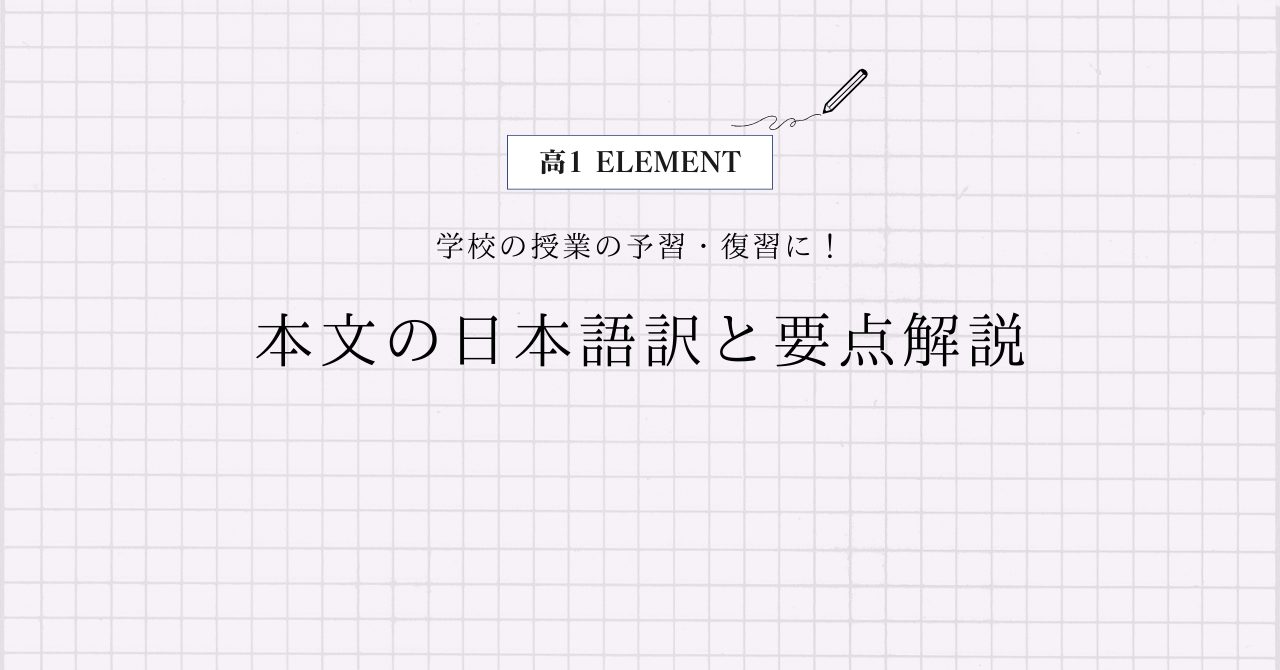三省堂 高1ELEMENT Lesson2 Section2の本文の日本語訳と重要箇所の解説です。
Lesson2-1, 2-3, 2-4の解説はこちらからご覧ください。
>高1ELEMENT Lesson2 Section1 本文和訳
>高1ELEMENT Lesson2 Section3 本文和訳
>高1ELEMENT Lesson2 Section4 本文和訳
- ELEMENT Lesson2 Section2 本文と日本語訳
- ELEMENT Lesson2 Section2 重要事項の解説
- The male lion was named Christian.
- In just a few days, Christian came to like his new life with John and Ace.
- The two men and Christian got on really well.
- When one of the men was talking to the other, Christian would touch him gently to show that he wanted to play with them.
- Christian also loved to go out.
- John and Ace bought a special collar for him.
- When they went out for a walk with him, he pulled on his lead like an excited little dog.
- They also ran and played with a ball together in a field for hours.
- “I can’t imagine life without him,” John said with a smile.
- At first, people were surprised to see a lion in London.
- However, they soon found that Christian was a lovely little friend.
- Lots of people, including newspaper photographers and television reporters, came to see him.
- However, Christian was growing up very fast.
- John and Ace felt that their happy life wouldn’t last long.
- ELEMENT Lesson2 Section2 まとめ
ELEMENT Lesson2 Section2 本文と日本語訳
The male lion was named Christian.
「そのオスライオンはクリスチャンと名付けられました。」
In just a few days, Christian came to like his new life with John and Ace.
「ほんの数日で、クリスチャンはジョンとエースとの新しい生活が好きになりました。」
The two men and Christian got on really well.
「2人の男とクリスチャンは本当に仲良くやっていました。」
When one of the men was talking to the other, Christian would touch him gently to show that he wanted to play with them.
「2人のうちのどちらかがもう1人と話していると、クリスチャンは彼らと一緒に遊びたいということを示すために、優しく触ったものでした。」
Christian also loved to go out.
「クリスチャンは外出することも大好きでした。」
John and Ace bought a special collar for him.
「ジョンとエースは彼のために特別な首輪を買いました。」
When they went out for a walk with him, he pulled on his lead like an excited little dog.
「彼らがクリスチャンと一緒に散歩に出かけると、クリスチャンは興奮した子犬のようにリードを引っ張りました。」
They also ran and played with a ball together in a field for hours.
「彼らは何時間も野原で一緒に走ったり、ボールで遊んだりもしました。」
“I can’t imagine life without him,” John said with a smile.
「『クリスチャンがいない生活は想像できない。』とジョンは笑顔で言いました。」
At first, people were surprised to see a lion in London.
「はじめは、人々はロンドンでライオンを見て驚きました。」
However, they soon found that Christian was a lovely little friend.
「しかし、彼らはクリスチャンがかわいい小さな友達だとすぐに気づきました。」
Lots of people, including newspaper photographers and television reporters, came to see him.
「新聞のカメラマンやテレビレポーターを含む多くの人が彼に会いに来ました。」
However, Christian was growing up very fast.
「しかし、クリスチャンはとても速く成長していきました。」
John and Ace felt that their happy life wouldn’t last long.
「ジョンとエースは、彼らの幸せな生活は長く続かないだろうと感じていました。」

ELEMENT Lesson2 Section2 重要事項の解説
The male lion was named Christian.
“male”は「オスの、男性の」という形容詞、“name”は「と名付ける」という動詞です。
ここでは「受動態」になっていますね。
In just a few days, Christian came to like his new life with John and Ace.
“in just a few days”で「ほんの数日で」という表現になります。“just”で強調されているわけですね。
“come to 動詞の原形”は「~するようになる」という表現で、“life”は「生活、人生、命」といった名詞です。
“with”は前置詞で、今回のように「~と一緒に」と訳すことが多いですが,必ずしも後ろに人が来るわけではありません。イメージとして「~とセットで」と覚えておきましょう。
The two men and Christian got on really well.
“men”は“man(男性)”の複数形ですね。
“get on well”で「仲良くやる、うまくやる」という表現になります。
When one of the men was talking to the other, Christian would touch him gently to show that he wanted to play with them.
この文では「接続詞when」が使われていますね。また、「過去進行形」にもなっています。
“one of 名詞の複数形”は「~のうちの1つ(1人)」という意味で、“the other”は「もう1つ(1人)の」となります。
“talk to(with) 人”で「人と話す」という意味です。
“would”は「~したものだった」という過去の習慣を表す助動詞として使われています。
“touch”は「に触る」という動詞で、“gently”は「優しく」という副詞になります。
“show”は「を示す、見せる」という動詞で、“show”の後ろには「接続詞that」がありますね。
“want to 動詞の原形”で「~したい」という重要表現です!「不定詞の名詞的用法」と一緒に確認しておきましょう。
“play”は「遊ぶ」という動詞で、“them”は“the men”を指しています。
Christian also loved to go out.
“also”は「また,さらに」といった副詞で,付け加える役割があります。色々な文で使うので必ず覚えましょう!
“go out”は「外出する、外に出る」という意味で、ここでは「不定詞の名詞的用法」になっています。
John and Ace bought a special collar for him.
“special”は「特別な」という形容詞、“collar”は「襟、首輪」といった名詞です。
“for”は「~のために」といった前置詞ですね。
When they went out for a walk with him, he pulled on his lead like an excited little dog.
この文では「接続詞when」が使われていますね。
“they”は“John and Ace”を指していて、“go out for a walk”で「散歩する」という表現になります。
“pull on~”は「~を引っ張る、手繰り寄せる」という意味で、“lead”は「リード」ですね。
“like”は「~のような」という前置詞で、“excited”は「興奮した、わくわくした」、“little”は「小さな」という形容詞になります。
They also ran and played with a ball together in a field for hours.
“they”は“John and Ace”を指していて、“ran”は“run”の過去形です。
“together”は「一緒に」という副詞、“field”は「野原、フィールド」といった名詞ですね。
“for hours”で「何時間も」という表現です。
“I can’t imagine life without him,” John said with a smile.
“imagine”は「を想像する」という動詞で、“without”は「~なしで」という前置詞です。
“with a smile”は「笑顔で、微笑んで」といった表現になります。
At first, people were surprised to see a lion in London.
“at first”は「最初は、はじめは」といった表現です。
“be surprised”で「驚く」となり、“to see”は驚いた理由を表す「不定詞の副詞的用法」になっていますね。
また,“excited”, “surprised”, “intersted”のような“-ed”で終わる形容詞は,基本的に主語が「人」のときに使います。
一方で“exciting”, “surprising”, “interesting”のような“-ing”で終わる形容詞は,基本的に主語が「もの」のときに使います。
However, they soon found that Christian was a lovely little friend.
“however”は「しかし」という意味の副詞になります。
同じ意味で“but”がありますが,こちらは接続詞なので品詞が異なります。“but”は“文A,but 文B”というように,2つの文を繋ぐ際に使います。
“文A. But 文B.”というように,“but”を文の先頭に置いて1文だけで完結させるのは原則NGとなります。
“they”は“people”を指していますね。“soon”は「すぐに」という副詞です。
“found”は“find(を見つける)”の過去形ですが、“find that~”という形のときは「~だとわかる、気づく」といった意味になります。
“lovely”は「愛らしい、かわいい」という形容詞ですね。
Lots of people, including newspaper photographers and television reporters, came to see him.
“lots of~”は“a lot of~”と同じで「たくさんの~」という意味です。
“including”は「を含む」という重要な前置詞で、“photographer”は「写真家、カメラマン」、“television”は「テレビ」、“reporter”は「記者、レポーター」という名詞ですね。
However, Christian was growing up very fast.
“grow up”は「成長する」という表現で、「過去進行形」になっています。
“fast”は「速く」という副詞ですね。
John and Ace felt that their happy life wouldn’t last long.
“felt”は“feel(を感じる)”の過去形で、後ろには「接続詞that」がありますね。
この“would”は“will”の過去形で、“felt”が過去形なので時制の一致のルールが働き、助動詞も過去形になっています。
“last”は「続く」という動詞、“long”は「長く」という副詞になります。
ELEMENT Lesson2 Section2 まとめ
以上がELEMENT Lesson2 Section2の日本語訳となります。
>高1ELEMENT Lesson2 Section1 本文和訳
>高1ELEMENT Lesson2 Section3 本文和訳
>高1ELEMENT Lesson2 Section4 本文和訳
何か分からない点や他に解説してほしい点があれば,お気軽にコメントしてください!


コメント